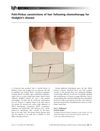Hair Loss Pattern Due to Chemotherapy-Induced Anagen Effluvium: A Cross-Sectional Observation
January 2007
in “
Dermatology
”

TLDR Chemotherapy often causes patterned hair loss, with some scalp areas more resistant to hair loss than others.
The study, conducted over two periods in 2004 and 2006, involved 64 patients with anagen effluvium, a type of hair loss caused by chemotherapy. It found that 71.9% of patients retained hair along their hairline, with differences between males and females; 50% of males kept their occipital hairline, while 52% of females kept their total hairline. The pattern of hair loss was not significantly affected by age, symptoms, type of chemotherapeutic agent, or combination of agents. Hair loss typically started 7-10 days after the beginning of chemotherapy and was most noticeable after 1-2 months, lasting for 3-4 weeks. Hair regrowth began weeks after the end of chemotherapy, with 65% of patients noting changes in hair characteristics. The study concluded that anagen effluvium results in patterned hair loss, with certain scalp areas showing resistance to chemotherapy. The document also suggests that this patterned hair loss could be due to increased sensitivity of certain scalp areas to chemotherapy, potentially influenced by androgen interactions. The authors recommend a larger study to explore this further.










